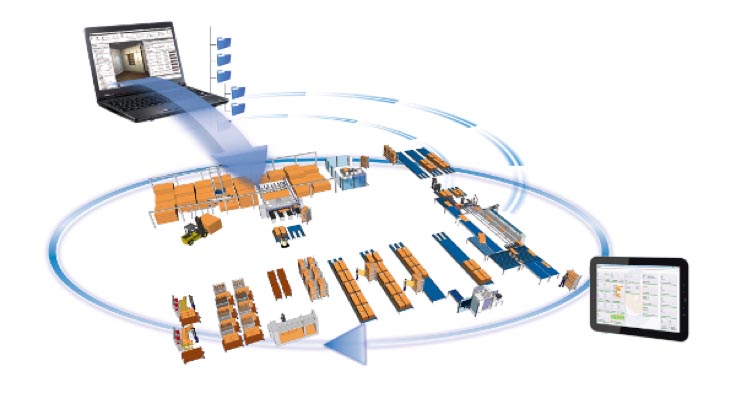GERMANY – Digitalization and networking of production beyond company and national boundaries – this is the core of the “Industry 4.0 vision”.

The aim is for widely diverse units within the company to communicate with each other and even organize themselves. At the same time, machines operating today within a completely networked production set-up already “know” which component is currently needed, how it has to be processed and where storage bottlenecks exist. But what does all this mean for woodworking shops? We asked Homag Group expert Niklas Kögel.
What does a woodworking shop need to do if it wants to network its operations and what are the benefits?
Kögel: Entry into “networked production” can be subdivided into three stages for woodworking shops.
Stage 1 – Networking the office and production.
First a suitable infrastructure has to be created in the company. This entails integrating all the machines into the network, shifting tasks from the workshop to the office (such as CNC programming) or organizing the data storage centrally. Another important factor is the use of labels with barcodes for the unambiguous identification of workpieces so they can be assigned to production data and processes.
The benefits: If CNC programming is transposed to the office, capacity at the machine is increased. Networking the office and production simplifies other work processes too. CNC programs can be stored centrally on the server – meaning that new programs or updates are automatically available to all the machines. By using a label with barcode, the programs can be automatically loaded into the machine and other work steps such as assembly or order picking are simplified.
Stage 2 – Automated data generation / vertical networking.
Here, the focus is on the optimization of IT processes during preparation for production. The question here is: “How do I translate a customer requirement into production data?” This is achieved by for instance using a CAD/CAM system – such as woodCAD|CAM from Homag eSOLUTION.
The benefits: With the woodWOP Tools “Project Manager” and “DXFImport professional”, the programming work required can be significantly reduced. Use of a CAD/CAM system makes for more efficient production engineering and reduces the need for manual work steps. In addition, the throughput times in production are reduced, as complete production information – such as cutting list, label, CNC programs, drawings – are available for all elements being produced. This helps avoid errors and unnecessary raising of queries.

The benefits: Production becomes more transparent for the joiner. Questions such as “do I already have all components ready for order XY?” or “do I have enough capacity to process the order” can always be answered in real time. The component becomes a “knowledgeable workpiece” and all the relevant information can be accessed at any time. Every component is ready at the right workplace for processing when it is needed. This supports the joiner in organizing operations such as finish processing or order picking.
Does a networked workshop mean that a joinery needs fewer staff?
Kögel: What is clear is that networking and process automation will change the type of work done by employees. This is both an opportunity and a challenge for any operation and for any employee. The human factor is vital.
How does the HOMAG Group support its customers en route to the networked workshop?
Kögel: With intelligent and resource-efficient machines, smart service concepts, software for “networked production” and comprehensive advisory support, we help our customers to create more intelligent and efficient processes and to develop their production step by step into what can be termed “Smart Production”. Every company is different. Working together with the experts from Schuler Consulting, we advise and support each one individually – through to implementation and beyond. This makes us successful on a global scale, as the individualization of products and highly flexible production are already reality, particularly in woodworking shops.


0 Comments